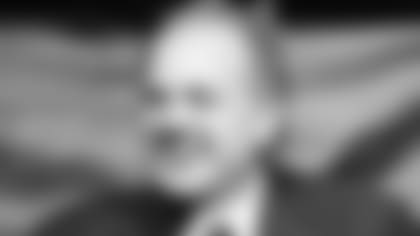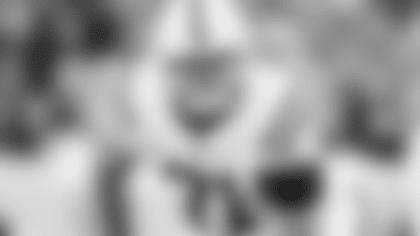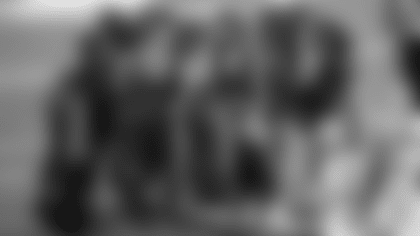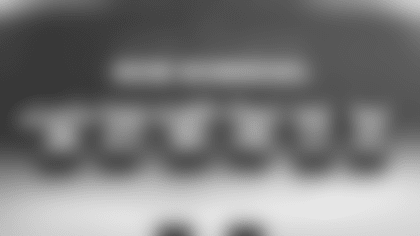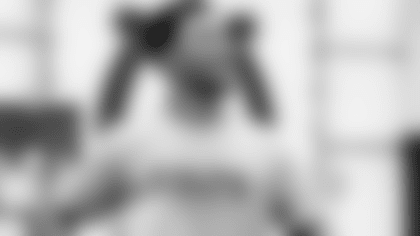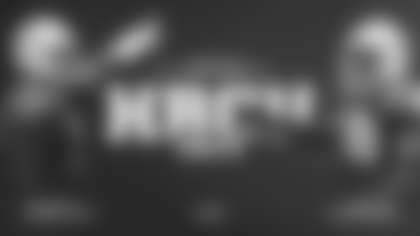What was your best sport growing up? For some people it might not have been football.
"I really was a two-sport guy. I wrestled, but I would have to say football was my best sport. My Uncle Joe introduced me to wrestling. He was a wrestler himself and coached it at Southern Illinois. I started wrestling when I was young. I don't remember what age I was, but I remember going to tournaments at a young age. I wrestled all the way through my senior year in high school. I loved wrestling and loved the competition involved in it, but I would have to say football was my best sport."
What was it about wrestling that you liked? Were you glad or sad to stop wrestling?
"The one-on-one competition part of wrestling was fun. It was just you and the other guy. It was a grind. Three two-minute rounds were a real challenge. The competitive side of it was fun, but the technical side of it was a challenge. In middle school I think I wrestled 78s in my eighth-grade year. I was a little guy. I went to high school at 135 pounds and graduated at 155 pounds. I was a little heavier my senior year, but a 155-pounder was a state champ, so I had to move up a class. I wrestled all the stud linebackers who dropped from 185, 190 pounds down to the 167-pound class. It was a big challenge for me. Every day when practice was over, you were glad to be done with wrestling (laughs). It was a grind. You had to put a lot of time in it."
When did you start playing football? It probably was an early age, given that your father, Sam, was a prominent and successful head coach.
"I started playing as soon as I could strap on a helmet. It was Pop Warner, and I was eight or nine years old. We were the 'Blue' team. I can remember going down to the Parks and Recreation Office on a Saturday morning on opening day of Pop Warner Football. You got your physical form with you, mom and dad took you down there. There was a big shed out in the back by the fields and you got in line. They handed you your equipment – helmet, pads, pants, shoulder pads and you strapped it up. They gave you a colored jersey, put you on a team, and you went at it. Growing up I played running back and linebacker. After Pop Warner, I played the slot receiver. At Fairview High School, I was a defensive back and receiver. It's where they stuck me."
Some people have family to try to talk them out of playing, but it probably was expected of you to be a football player.
"Being around it and living it, my mom, Diana, was worried like any mom would worry but no one ever really tried to talk me or my little brother, John, out of playing. It was the natural progression for us."
Your high school and where your dad coached (Fairview) was pretty prominent high wasn't it?
"At the time I was there, the enrollment was pretty high. There were about 1,500-to-2,000 students. There were only two high schools in Boulder, and there was a lot of tradition at Fairview. A lot of great players went through there. Tony Boselli was one of the most famous, and he played for my dad there. Former Colts offensive tackle Kevin Call also graduated from Fairview, and I know fans in Indianapolis remember him. It was a big high school."
Did you enjoy the achievements your father had there? It had to be different having a high profile father, and did his work help set you on a football path?
"Playing for him was tough. Once I went off to college and watched him coach and watched his teams do well and have the success he had, I took a lot of pride in that. The family had a lot of pride in what he did, 'That's my dad's team.' I would get back to town and watch him coach in the playoffs. He won a couple of state championships. It was very fulfilling. It makes me proud for what he has done. It makes me proud to hear the things that have been said about him. We (Chuck and John, the defensive coordinator with San Diego) learned a lot from him. He's a relationship guy. Obviously, he won a lot of games, but more important to him is that he has touched a lot of lives. That's why we're all in this thing."
*Did you ever feel you were sharing your father with a lot of other people? *
"We never looked at it like that way. We knew it was how he made a living. It was his passion. It was his job. We understood it and knew the demands on him to be successful. I never looked at it like that."
Your father had to be the biggest football influence you ever had, right?
"Yes, he was. I grew up on the sidelines, went to practices and hung out in the locker room. I picked up towels and was a ball boy and hung out with him, his staff and the players. He was by far the biggest influence early in my career. I think a few people can tell you their father was their hero. I have been surrounded by a ton of people, and I've been fortunate to have worked for some great people, but he definitely is a hero in my eyes."
Talk about yourself as a player. How would you characterize yourself?
"I was an overachiever with limited athletic ability. I prided myself on working hard and being tough. My dad wouldn't play me early. I had to wait until my senior year to actually start. We had a lot of good players on our team. Being the son of the head football coach, he wasn't going to put me out there unless it was clear-cut that I was the better player. I had to sit back and wait for a while because he wasn't going to listen to parents say, 'He's playing because he's the son of the head coach.' He was going to make sure it was clear-cut. I saw it totally different than he obviously saw it. It all worked out. I guess got by on knowing the game, working hard and trying to out-work my opponent."
Was his approach something that was tough on you then, but that you appreciate after the fact?
"In my sophomore year, we moved from being in the town to living a little more out in the country. I didn't have a car, so I had to ride with dad to school every day (laughs). I wouldn't talk to him, all the way in and all the way home. At that time, my mom wished that I were playing, just like all mothers feel. I can remember my junior year, it was really tough because I wanted to play. My mom thought I was good enough to be a starter, but he obviously didn't see it that way and stuck to his guns like a coach should. It was a tough year, but everything worked out. Those are all feelings we can look back now on and smile as a family."
Why did you choose the college you chose?
"I wasn't highly-recruited. I was 155 pounds and slow. Those weren't the traits everyone was looking for. I had some scholarships to some small schools in Colorado – Ft. Lewis, Adams State, places like that. I wanted to play D-1 football. The University of Wyoming was just up the road, a couple of hours. It was close enough that if I had to get home, I could. It was close enough where my family could come up to watch me play. It was far enough away, too, that I felt I was away at college. It was a D-1 school in a highly-competitive conference at the time – BYU, Utah, Colorado State, San Diego State, Hawaii – it was a great conference. That's why I chose it. Bill Lewis was the head coach at the time. Tom McMahon, God rest his soul, was the secondary coach. They had come down and recruited Sam's high school. My dad had the Mile High Football Camp, so a lot of those coaches had worked for my dad at camp. Walking on there at the time, there was an unlimited number of players. I remember showing up on campus with about 150 other walk-ons. It was a pretty competitive situation. I was in a line of strong safeties that was so long that I had to be 10th or 11th on the depth chart. It was crazy but at the end of the year, there were a handful of us left. We started with 150 walk-ons and ended with about five left standing at the end. It's all about determination. Determination absolutely can get you places. You have to persevere. I can remember going up there, seeing the numbers and seeing what the challenge was. You always had that dream and goal. I knew I wanted to play football at that level. Then you get in and get discouraged because you're not playing and when you're not playing, nothing is going right. I remember calling home and saying, 'I want to transfer. I want to go somewhere where I can get on the field sooner.' My dad was like, 'You're not leaving. We said we're going to make a commitment to this thing. You have to give it at least a year. That's what we said we were going to do.' Needless to say, it all worked out."
You are type of person who sticks with things and stays committed, rather than making excuses, aren't you?"Absolutely, that goes without saying. I just look at my dad and his success. I look at the success of the people I've been surrounded by, and the guys who I've worked for and they never used excuses. They've always been accountable. The time and hard work you put in and the effort you put forth at the end of the day and no matter what happens, you can look yourself in the mirror and say, 'I did everything I possibly could.' You leave it all out there on the field and whatever happens, happens. You don't make excuses for anything."
What was your best collegiate experience?
"Beating BYU for the first time. They had a ton of great quarterbacks who went through there. Jim McMahon in that game (1981), and we played them in a snowstorm in Laramie and beat them, 33-20. That was probably the highlight of my career. It was a great team win over a quality opponent. Team accomplishments stand out much more than any individual achievement. When a team has success and wins, there is enough credit to go around for everybody. It was a great moment. We beat McMahon, and they had a lot of other great players, too. It was pretty special."
When did you first think about a career in football after your playing days?
"I didn't think about it much, it just kind of fell that way. Probably as soon as I ran my 40 at Pro Day (laughs), I knew there wasn't going to be a professional career. I knew I'd better get serious about my academics. I knew in order to be a graduate assistant and go on to be a college coach you had to have your degree. I was going to get it. I thought I might get it a little later rather than sooner but when I ran the 40 and looked back and saw those pro scouts shaking their heads, I knew my playing days were over. Running that 40-yard dash, I felt like I weighed 250 pounds. I knew I wasn't fast enough or good enough to play at the next level. It's everybody's dream (to go on to the NFL), anybody who's competed or played at the collegiate level. It's everybody's dream in college if you were serious about the sport. It's disappointing because your playing days are over and school is about over. You were having to get on with your life and make a decision about what you're going to do. My dad tried to talk both John and me out of coaching. He said, 'You don't want to lead this kind of life. It's too hard on your family. You have a degree in business, you might as well use it.' I said, 'No, this is all I know. This is what I've been around my whole life.' "
Do you remember putting on a uniform for the last time?
"I don't think even though you're strapping it up for the last time, you realize it is the final time you will ever do it. You have hopes and dreams of playing at the next level in the NFL. It was probably more finishing a career with a lot of guys you started with, the relationships you built with your teammates, that is the toughest thing going into a final game. It was tough knowing you won't strap it up again with those guys."
Did you always wear the same jersey number, or was there a number that meant something to you?
"My freshman year we had so many players. There were about 150 walk-ons and there were another 100 on scholarship, I was like 32c. There were five guys wearing number 32, and I was one of them. I eventually got into number five. That was my number. That was Paul Hornung's number. That's the reason why I picked number five. I loved how he played the game. It appealed to me. A lot of people saw how he played at Notre Dame, and he was a strong presence in Green Bay. Hornung was a battler with a nose for competition. His teammates respected how he performed on the field and it showed in their play. He had a certain style in how he performed, and I noticed that style. I also liked how the number looked. I wore it in high school and eventually I wore it in college when it became available."
What is your favorite quote on football, leadership, etc. that has shaped your career the most? Explain how/why/when you found it and how you have applied it.
"I like, 'The harder you work, the harder it is to surrender.' I really love reading Vince Lombardi's quotes, particularly the one a 'Man's Finest Hour.' The saying goes, 'I firmly believe that any man's finest hour – his greatest fulfillment of all that he holds dear – is that moment when he has worked his heart out in good cause and lies exhausted on the field of battle – victorious.' That is a saying that has stuck with me for a long time, 'Man's Finest Hour.' It doesn't matter what level you're coaching on, you try to give your players a few things here or there. It may be from a great boxer like Muhammad Ali, or a coach like Lombardi. You try to exposure your players to as much as you can. You see locker room quotes from different guys. We have some things we're trying to put up around here. When the moment is right, you try to share as much as you can."
You can draw strength and lessons from words, can't you?
"Once you get to the professional level, some of the things you do in high school or college may not be as effective here. I still think that anyone who has a passion and love for this sport from a motivational standpoint, I still think there are some things out there you can give to players that hit home, touch them and be something they relate to."


